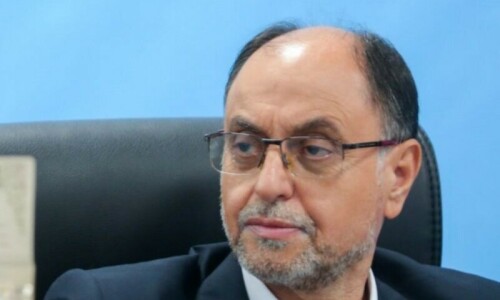ISLAMABAD: The Parliamentary Committee on Judges Appointment has decided not to hold its meetings to consider Judicial Commission’s recommendations for appointment of judges in the superior judiciary till it has a meaningful role and is able to contribute to the process.
After an in-camera meeting presided over by MNA Syed Naveed Qamar on Thursday, the committee said in a statement that it had no say in the appointment of judges.
“The Parliamentary Committee felt that it has become a rubber stamp to approve or confirm a nomination (of judges) sent by the Judicial Commission.”
The committee said it had thoroughly discussed and debated the issue as there were continuing and growing reservations about deciding the recommendations made by the Judicial Commission. It was observed that in the past decisions made by the committee had been overruled through judgments by the High Courts on the basis of judgments of the Supreme Court.
The committee was of the considered opinion that its meetings were not only a burden on the exchequer but also a waste of time as its recommendations carried no weightage in view of superior court judgments.
“The committee decided that it will not hold any meetings to consider Judicial Commission recommendations till it has meaningful role and contributions in the process of appointment of judges in the superior courts.”
Under Article 175-A of the Constitution, the Judicial Commission of Pakistan (JCP) recommends names of judges for appointment in the superior judiciary whereas the parliamentary committee validates or approves them.
But the Thursday’s meeting, despite reservations, endorsed the recommendations of the JCP for appointment of judges in the Supreme Court and the Chief Justice of the Lahore High Court and confirmation / extension of four additional judges of the Peshawar High Court.
The committee observed that the elevation of two judges from the LHC to the Supreme Court was not based on any quota or seniority.
It called upon the government to place before parliament a Constitutional Amendment Bill aimed at strengthening the role of the parliamentary committee in the appointment of judges.
A member of the committee told Dawn that under the proposed amendment a six-member committee comprising judges, lawyers and government officials would be set up to recommend to the Judicial Commission names of lawyers for their appointment as judges of high courts.
The amendment would enable the parliamentary committee to have a final say in appointment of judges, which would not be challenged in court.
The 18th Amendment has empowered the JCP to nominate or recommend a person for appointment as a judge in the superior judiciary while the parliamentary committee’s job is to endorse the recommendation.
The controversy over powers of the parliamentary committee and JCP surfaced after former Chief Justice Iftikhar Mohammad Chaudhry, while hearing petitions against the 18th Amendment in October 2010, held that “if parliamentary committee disagrees or rejects any recommendations of the Judicial Commission, it shall give specific reasons and the Prime Minister shall send a copy of the said opinion of the committee to the Chief Justice of Pakistan and the same shall be justiciable by the Supreme Court”.
Later, the government introduced the 19th Amendment, but it did not give the JCP a final say in the appointment of judges.
In February 2011 when the parliamentary committee rejected the JCP’s recommendations about four additional judges of the Lahore High Court and two judges of the Sindh High Court, some lawyers took the matter to the Supreme Court.
Deciding the petitions, the apex court observed that the parliamentary committee was not mandated to evaluate professional capabilities. The said order, according to lawmakers, made the PC merely a rubber stamp. The apex court also declared that the recommendations of the JCP would attain finality if the parliamentary committee did not take them up within a fortnight.











































